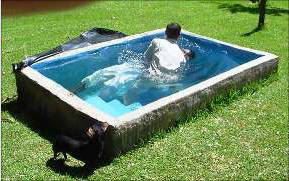The story is told that the American preacher came to Africa and soon there were people to be baptized. When the crowd came to the river, the men took long canes and began beating the water. The evangelist said, “Brethren, you must stop that superstitious practice. I have come to bring the gospel to deliver you from those things.” They replied, “Brother, you don’t understand. We are scaring away the crocodiles.” The preacher replied, “Beat on, brethren! Beat on!”
When I was baptized the cold water caused me to catch my breath and choke. Later an experienced preacher told me how to keep that from happening, and now I always take my hand and put water on the back of the neck of the one to be baptized before immersing him or her. This has worked perfectly for me.
Some years ago I made monthly trips to a town four hours from Eshowe. I baptized a number of people in a very dirty, slow-moving river. Later I found that I had contracted bilharzia, a disease caused by a microscopic parasitic worm which causes bleeding in the urine, etc. A snail which lives in warm water is the host of the worms, and the tiny worms which are released in the water penetrate the skin of people who go into the water. Fortunately, this disease which used to be a terrible scourge in Africa is now easily cured with one dose of a particular worm medicine.
 On one occasion I baptized two ladies in a bathtub. When I tried to baptize the second one, she panicked and would not let me put her head under the water. I vowed then never to baptize a person in a bathtub again!
On one occasion I baptized two ladies in a bathtub. When I tried to baptize the second one, she panicked and would not let me put her head under the water. I vowed then never to baptize a person in a bathtub again!
Leslie Maydell devised a portable baptistery which is ideal for using in places where water is scarce. Here is one of them being used in Zimbabwe.
When I visited Sewell Hall in New York City, he showed me a horse watering trough on his patio. This was his baptistery.
 The first thing I did when we moved to Eshowe, South Africa was to build a baptistery in our yard. My gardener and I built it of bricks and concrete, and it has been ideal.
The first thing I did when we moved to Eshowe, South Africa was to build a baptistery in our yard. My gardener and I built it of bricks and concrete, and it has been ideal.
About 1954 when I was preaching in The Dalles, Oregon a man came forward on an Easter Sunday to be baptized. When I baptized him I miscalculated and bumped his head on the steps. Later, when he did not change his worldly lifestyle, I found that he had been told by his sister, “John, you would be the perfect father if you would only be baptized.” So he was. I then wished I had hit his head harder!
 Bro. Francis Okech sent me this picture of baptizing in the big lake in Uganda. I like the idea of having two people to do the baptizing.
Bro. Francis Okech sent me this picture of baptizing in the big lake in Uganda. I like the idea of having two people to do the baptizing.
There has been a lot of controversy over what should be said when baptizing a person. One preacher told me that when he baptized two sisters he said the usual things before baptizing the first, then baptized the second without saying anything further. Some were sure that the girl had not been baptized correctly! The truth is, God has not told us what to say, or whether to say anything all, when we baptize a person. The important thing is what we do. The one being baptized should understand the purpose of the baptism (remission of sins), and that the baptism is into the name of the Father, the Son and the Holy Spirit by the authority of Jesus Christ. I usually say just that, but it would be just as scriptural if I said nothing.
But don’t make the mistake the beginning South African preacher made. The first time he baptized, everything went well. But the second time he got a bit confused and put the person under the water just as he was beginning to say what he was doing. He almost kept the person under the water too long!
(NOTE: The Herald of Truth began in 1952 as a weekly nation-wide radio program over the Mutual Broadcasting Network, sponsored by the 5th and Highland Church in Abilene, Texas and supported by churches all over America. It became a TV program and was the single most important project to cause the controversy over institutionalism to split churches.—PKW)
Richard Hughes is a professor at Pepperdine University. He and I would be poles apart in our thoughts concerning how to use the Scriptures. But he made a point about the Herald of Truth that I never thought of. He said in his book (Reviving the Ancient Faith—PKW) that the anti-institution people missed this, and that the Herald of Truth people missed this; it was such a subtle thing that people were not aware of what was taking place. But he says that when the Herald of Truth began, the greatest influence among churches of Christ shifted from the brotherhood papers to the Herald of Truth. People all over the country were supporting it, and people all over the country were listening to it. He further says that a major change took place in the preaching on the Herald of Truth. He says that when the Herald of Truth first began, the preaching was focused on the one true church, baptism for the remission of sins, no instrumental music, the Lord’s Supper every first day of the week. It was convincing people regarding the idea of restoring New Testament Christianity. That was the first teaching on the Herald of Truth. But by the late ‘60s and early ‘70s, they had begun to realize that the radio and TV programs that were really attracting the audiences were those that’s emphasis was more on family relationships, finding inner peace for yourself, how to build a strong self-image. Eventually the preaching of the Herald of Truth shifted from this more doctrinal, controversial type of teaching into this more “finding peace for the soul and a good self-image” type of teaching. Now, he said, all of the preachers of the country were listening to Herald of Truth, and as the Herald of Truth made that shift, the preachers made the same shift, so that by the ‘70s and ‘80s you could attend most churches of Christ for months and months and months and months and never hear a sermon on the one true church, restoring New Testament Christianity, or instrumental music. You might hear the plan of salvation given, but that’s about it.
And let me tell you something. There are some (I’m not going to say a lot. I believe most of the preaching I hear is good preaching) churches of Christ right now that are considered to be opposed to institutionalism that rarely ever get any sermons that are distinctive at all from what you could hear in denominations all over the country. And I want to make sure you hear me and hear me well. If you attend worship at some church where you never hear the question if instrumental music, or baptism for the remission of sins, or the Lord’s Supper every Sunday, or the one true church—if you never hear teaching along some of those distinctive lines, you need to get out and you need to go somewhere else. You’ll lose your conviction. If you don’t hear it regularly, you’ll lose your conviction.
Where do you get your sermon ideas? Many preachers find this a difficult task. But the preacher who is studying regularly and noticing the needs of members and visitors will find many subjects he wants to preach on.
The biggest and best source of sermon ideas should be your regular bible study. I recently decided to preach on Robbing God from Malachi 3:8, but when I began studying I found that everything in the book of Malachi is vitally necessary to preach today. The result: I am preaching a series of sermons based on the book.
If you jot down sermon ideas as they come to you in your daily bible reading, you will soon have a long list of subjects. The outlines may sometimes come directly from the verses.
A second source of sermon ideas is magazine articles by brethren. I have always subscribed to and read several magazines published by brethren. Many of the articles are condensations of what must be the best sermons of the authors. I find rich material there.
Of course current events can suggest topics, especially when religious topics are in the news. It has been necessary for me to preach on AIDS and the immorality of our society. The so-called “Gospel of Judas” and the recent “discovery” of the burial caskets of Jesus and Mary, etc. may give you an excuse to refute the rubbish which has been written about those things and give you a chance to give evidences to strengthen faith.
And we should always be aware of the needs of those who listen to us. We should be very careful to try to meet those needs in the sermons we preach.
Make sure that you do not preach on the same thing all the time. Always try to do good. And preach because you have an important message, not because you have to fill up the time!